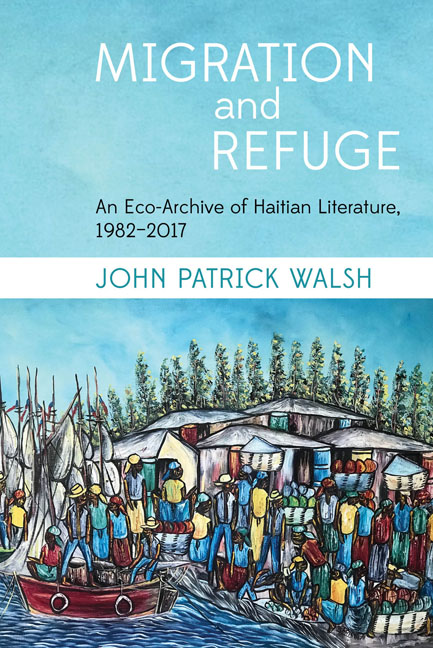Book contents
- Frontmatter
- Contents
- Acknowledgments
- Introduction: Tè glise, Continents à la dérive: Haiti between Shifting Continents, Past and Present
- Part I The Eco-Archive
- Part II Literary Witnesses
- Part III The Anthropocene from Below
- Epilogue Land and Seas of Migration and Refuge, Past and Present
- Bibliography
- Index
4 - The Distant Literary Witness and the Ghosts of History in the “Other America”
- Frontmatter
- Contents
- Acknowledgments
- Introduction: Tè glise, Continents à la dérive: Haiti between Shifting Continents, Past and Present
- Part I The Eco-Archive
- Part II Literary Witnesses
- Part III The Anthropocene from Below
- Epilogue Land and Seas of Migration and Refuge, Past and Present
- Bibliography
- Index
Summary
And during this final conversation, I am even more certain that to create dangerously is also to create fearlessly, boldly embracing the public and private terrors that would silence us, then bravely moving forward even when it feels as though we are chasing or being chased by ghosts.
Edwidge Danticat, Create Dangerously, 148This chapter examines the literary witnessing of Edwidge Danticat and Dany Laferrière. Consistent with the preceding chapter, it pairs testimonial texts and fiction (Danticat's Create Dangerously and Claire of the Sea Light, along with Laferrière's Tout bouge autour de moi and L’Énigme du retour) to consider the creative reconstruction of Haiti through its “living archive.” The critical literature on these two authors is voluminous. As such, after a brief comparison, the bulk of the chapter is devoted to Danticat. This decision is both practical and strategic. Camus plays a leading role in Danticat's Create Dangerously, and therefore I continue to analyze Haitian rereadings of the French-Algerian. In pursuing this lead, I am in good company. J. Michael Dash writes eloquently of Danticat being inspired by Camus's varied depictions of the solitary artist in pursuit of unbounded solidarity.3 More recently, Christian Flaugh underscores Danticat's admiration for friends of her parents in their secretive staging of Camus's play, Caligula, in Duvalier’s Haiti. “This particular popular theatre,” Flaugh contends, “revealed a transcultural performance practice by way of a twentieth-century French- Haitian traversée” (“Engaging Reality and Popular Performance,” 48). Flaugh's characterization of this intertextuality as a kind of crossing is richly suggestive of the historical and cross-cultural depths of the literary archives treated in this book.
This chapter focuses on a different Camus than the more uplifting figure resurrected by Lahens. Although both writers reflect on the ethics of the writer in times of crisis, Danticat evokes the Camus whose literature was celebrated by the Nobel Committee at the same time that his peers rebuked his political stance on the war in Algeria. Camus was beholden to the myth of the Mediterranean as a space of timeless humanism and hospitality. Yet the colonial setting would also induce a sense of alienation, a feeling of distance and estrangement that Camus famously explored in L’Étranger and the short stories of L’Exil et le royaume.
- Type
- Chapter
- Information
- Migration and RefugeAn Eco-Archive of Haitian Literature, 1982–2017, pp. 139 - 172Publisher: Liverpool University PressPrint publication year: 2019

